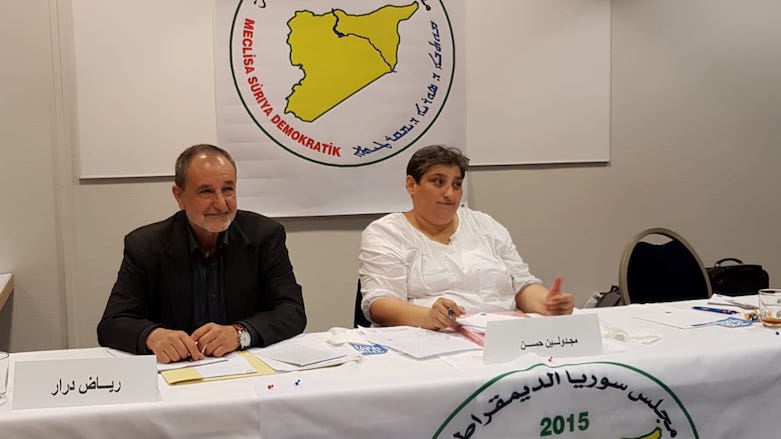Kurdish-backed council says EU should not obstruct prosecution, repatriation of ISIS fighters

ERBIL (Kurdistan 24) – Syrian Democratic Council (SDC) co-chair Riyad Derrar told Kurdistan 24 on Saturday that Western governments, including the Netherlands, should not obstruct the establishment of an international court or the repatriation of their Islamic State nationals.
The statement comes after the Dutch government recently said it is not ready to work with the US-backed Syrian Democratic Forces (SDF) to set up an international court.
Most European countries have been reluctant to bring back Islamic State fighters or their families who are stuck in Syria. They fear that due to a lack of evidence, Islamic State members could be released once they appear in court upon their return.
“We have foreign fighters that joined ISIS and are held in SDF prisons. Some of them are ill. They should be taken care of. [EU countries] should help,” Derrar said.
“They are coming from different countries, and those countries should act responsibly and should take care of their citizens.”
In case these countries are unwilling to pick up these Islamic State fighters and their families, Derrar said the best solution would be an international court on the grounds where the terrorists carried out the crimes.
He warned that if there is no solution, this could pave the way for “a new wave of extremism and terrorism,” especially since many women and fighters still believe in the Islamic State’s ideology.
On Sept. 13, in response to a report from an external advisor, Dutch Foreign Minister Stef Blok said his country is not ready to work with the SDF to set up a court.
Blok made the comments even though the SDF was the main actor that defeated the so-called Islamic State in Syria with the support of the 74-member global anti-ISIS coalition, which includes the Netherlands.
In his statement, Blok described the SDF as “a non-state actor who is accused of human rights violations by several organizations,” singling out the People’s Protection Units (YPG) who make up a majority of the ranks.
The Dutch foreign minister accused the YPG of having ties to the Kurdistan Workers’ Party (PKK), “an organization that is listed on the EU terrorism list.”
Turkey has also accused the SDF of links to the PKK, a charge the SDF denies. In return, the Kurdish-led forces have accused Turkey of supporting the Islamic State.
The Dutch government had refused an earlier US proposal to help facilitate the repatriation of a small number of women with alleged Islamic State ties and their children.
Dutch authorities argue that they cannot send diplomats to pick up the foreign Islamic State fighters or their families, claiming northeastern Syria is unsafe.
Dutch nationals who joined the Islamic State would have to travel to neighboring countries or regions with a Dutch mission, such as Turkey, Iraq, or the Kurdistan Region.
Nevertheless, one Dutch diplomat picked up two orphans from Syria in June as part of a French delegation and met with local officials inside Syria.
According to the Dutch intelligence service (AIVD), there are 40 Dutch adults and 65 children currently in camps or detention centers in northeastern Syria.
SDC vice co-president Majdolin Hassan said the foreign Islamic State fighters and their families need to return to their countries.
“They are a big problem for us,” Hassan told Kurdistan 24. “They are not only a headache; they are a ticking time bomb.”
She called on Western diplomats to visit Syria’s northeast to collect their nationals.
According to Hassan, there are no safety risks since other diplomats from the United Kingdom, Germany, and Norway have visited the region before.
Dr. Abdulkarim Omar, the co-head of the foreign relations body of the local administration, could “facilitate” the entry of Western diplomats into Syria, she added.
Meanwhile, Derrar said they are open to Western diplomats coming to collect families with Islamic State ties, adding they can guarantee their safety.
Diplomats could also inspect SDF-run prisons or refugee camps where the families are held, he said.
“But, ultimately, any extradition process should take place officially,” Derrar underlined, with diplomats visiting the administration on the ground for an extradition process.
Editing by Karzan Sulaivany
